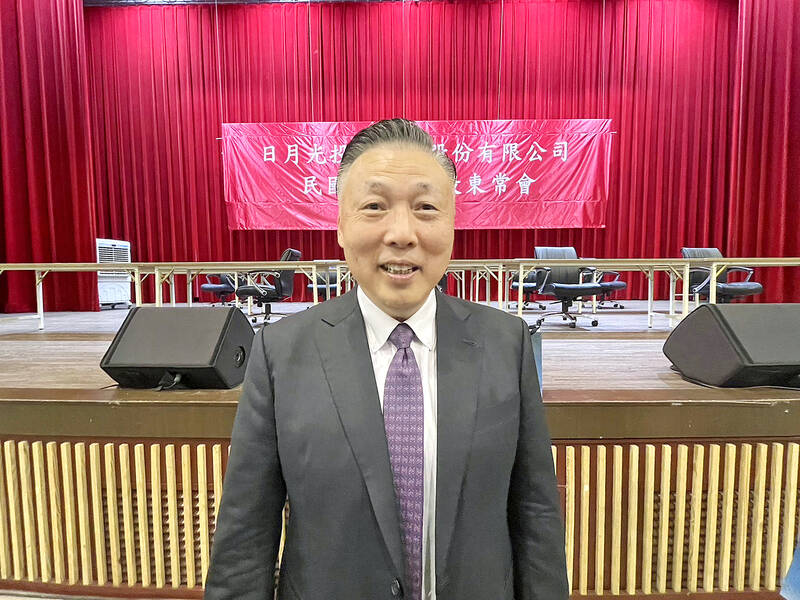ASE Technology Holding Co (ASE, 日月光投控), the world’s biggest chip packaging and testing service provider, yesterday said it plans to launch a new high-end chip testing fab in the US next month to better serve its key customers based in North America, particularly California-based artificial intelligence (AI) customers.
The new US testing facility would be operated by the firm’s subsidiary ISE Labs Inc, it said.
ASE’s major customers, and high-ranking US officials and representatives from American Institute in Taiwan are to attend the fab’s opening ceremony on July 12, it said.

Photo: CNA
ISE Labs last year acquired a 5,942m2 facility in San Jose, California, for US$24 million to expand capacity, ASE said in a filing with the Taiwan Stock Exchange.
ISE Labs’ new testing fab would be part of ASE’s broader global expansion plans, ASE said.
ASE is scouting potential sites to deploy advanced chip packaging capacity in the US, Japan and Mexico, in response to customers’ growing demand to strengthen supply chain resilience amid mounting geopolitical risks, ASE chief operating officer Tien Wu (吳田玉) told reporters on the sideline of the company’s shareholders’ meeting.
“With this substantial US investment, we intend to demonstrate our goal to create a global deployment. Our purpose is to take good care of our North American clients, very important clients, especially our AI clients based in California,” Wu said.
Additionally, ASE has applied to the US government to create a free trade zone in the region, allowing customers from different countries to ship advanced wafers there for testing and simplifying tedious export procedures, Wu said.
In Mexico, ASE has acquired a plot of land to build an automative electronics and power units supply chain there, with its subsidiary Universal Scientific Industrial (Shanghai) Co (環旭電子), Wu said, targeting North America’s automative electronics used in autonomous vehicles and next-generation robots.
In Japan, ASE is looking for a location to build a larger-scale advanced packing facility than its operation in Yamagata, Wu said.
In Malaysia, ASE is looking to expand its capacity in Penang, where the company operates a major manufacturing site, to cope with increasing demand from a European automative chipmaker, he said.
The companies have inked a long-term supply agreement, he added.
ASE also raised its forecast for the revenue growth from advanced packaging technology, or chip-on-wafer-on-substrate (CoWoS), this year, due to demand for AI chips.
“Earlier this year, we expected to have an additional US$250 million revenue increase from the CoWoS business. Now it looks like we will exceed that figure. AI demand will remain solid in the second half and through next year,” Wu said.
ASE is collaborating with Taiwan Semiconductor Manufacturing Co (台積電) to increase supply of CoWoS packaging capacity to catch up with strong AI chip demand, ASE said.

Intel Corp chief executive officer Lip-Bu Tan (陳立武) is expected to meet with Taiwanese suppliers next month in conjunction with the opening of the Computex Taipei trade show, supply chain sources said on Monday. The visit, the first for Tan to Taiwan since assuming his new post last month, would be aimed at enhancing Intel’s ties with suppliers in Taiwan as he attempts to help turn around the struggling US chipmaker, the sources said. Tan is to hold a banquet to celebrate Intel’s 40-year presence in Taiwan before Computex opens on May 20 and invite dozens of Taiwanese suppliers to exchange views

Application-specific integrated circuit designer Faraday Technology Corp (智原) yesterday said that although revenue this quarter would decline 30 percent from last quarter, it retained its full-year forecast of revenue growth of 100 percent. The company attributed the quarterly drop to a slowdown in customers’ production of chips using Faraday’s advanced packaging technology. The company is still confident about its revenue growth this year, given its strong “design-win” — or the projects it won to help customers design their chips, Faraday president Steve Wang (王國雍) told an online earnings conference. “The design-win this year is better than we expected. We believe we will win

Chizuko Kimura has become the first female sushi chef in the world to win a Michelin star, fulfilling a promise she made to her dying husband to continue his legacy. The 54-year-old Japanese chef regained the Michelin star her late husband, Shunei Kimura, won three years ago for their Sushi Shunei restaurant in Paris. For Shunei Kimura, the star was a dream come true. However, the joy was short-lived. He died from cancer just three months later in June 2022. He was 65. The following year, the restaurant in the heart of Montmartre lost its star rating. Chizuko Kimura insisted that the new star is still down

While China’s leaders use their economic and political might to fight US President Donald Trump’s trade war “to the end,” its army of social media soldiers are embarking on a more humorous campaign online. Trump’s tariff blitz has seen Washington and Beijing impose eye-watering duties on imports from the other, fanning a standoff between the economic superpowers that has sparked global recession fears and sent markets into a tailspin. Trump says his policy is a response to years of being “ripped off” by other countries and aims to bring manufacturing to the US, forcing companies to employ US workers. However, China’s online warriors